- Home
- William Goldman
Which Lie Did I Tell?: More Adventures in the Screen Trade Page 5
Which Lie Did I Tell?: More Adventures in the Screen Trade Read online
Page 5
He's a tireless speaker, knowledgeable and passionate--it's three full days over a single weekend and no one feels cheated when he's done. He started doing just Saturday mornings at a small school in California, but as interest in screenwriting has risen, so has he, and he is now all over the world. No matter what continent you live on, if you look outside and see a group of writers and movie nuts gathering, probably Robert McKee is in town.
I don't know if he can teach screenwriting, or if anyone can. But I do know this: after listening to him, I wish he'd been around when I started writing CUT TO for a living.
* * *
Misery
[1990]
* * *
Misery came about like this.
I got a call from Rob Reiner saying he was interested in this book by Stephen King and would I read it. He became interested when Andy Scheinman, Reiner's producer, read it on a plane and wondered who owned the movie rights. The book had been in print for a while, was a number-one best-selling novel, standard for King.
They found out it hadn't been sold--not for any lack of offers but because King wouldn't sell it. He had disliked most of the movies made from his work and didn't want this one, perhaps his favorite, Hollywooded up. Reiner called him and they talked. Now, one of the movies made from his fiction that King did like was Stand By Me, which Reiner directed. The conversation ended with King saying sure, he would sell it, but he would have to be paid a lot of money and that Reiner would have to either produce or direct it.
Reiner, who had no intention of directing, agreed. He would produce. He called me. I read Misery. I had read enough of King to know this: of all the phee-noms that have appeared in the past decades, King is the stylist. If he ever chooses to leave the world that has made him the most successful writer in memory, he won't break a sweat. The man can write anything, he is that gifted.
Misery is about a famous author who has a terrible car crash during a blizzard, is rescued by a nurse. Who turns out to be his number-one fan. Who also turns out to be very crazy. And who keeps him prisoner in her out-of-the-way Colorado home. It all ends badly for them both (worse for her). I was having a fine old time reading it. I'm a novelist too, so I identified with Paul Sheldon, who was not just trapped with a nut, but also trapped by his own fear of losing success. And Annie Wilkes, the nurse/warden, is one of King's best creations.
When I do an adaptation, I have to be kicked by the source material. One of the ways I work is to read that material again and again. So if I don't like it a lot going in, that becomes too awful. I wasn't sure halfway through if I would write the movie, but I was enjoying the hell out of the novel.
Then on this page the hobbling scene began.
Paul Sheldon has managed to get out of the bedroom in his wheelchair, and he gets back in time to fool Annie Wilkes. This is more than a little important to him, because Annie is not the kind of lady you want real mad at you.
Except, secretly, she does know, and in the next fifteen pages, takes action.
I remember thinking, Jesus, what in the world will she do? Annie has a volcanic temper. What's in her head? She talks to Paul about his behavior and then she eventually works her way around to the Kimberly diamond mines and asks him how he thinks they treat workers there who steal the merchandise. Paul says, I don't know, kill them, I suppose. And Annie says, Oh no, they hobble them.
And then, all for the need of love, she takes a propane torch and an ax and cuts his feet off, says, "Now you're hobbled," when the deed is done.
I could not fucking believe it.
I mean, I knew she wasn't going to tickle him with a peacock feather, but I never dreamt such behavior was possible. And I knew I had to write the movie. That scene would linger in audiences' memories, as I knew it would linger in mine.
The next half year or so is taken up with various versions, and I work with Reiner and Scheinman, the best producer I have ever known for script. We finally have a version they okay and we go director hunting. Our first choice is George Roy Hill, and he says yesss. Nirvana.
Then Hill calls and says he is changing his mind. We all meet. And Hill, who has never in his life done anything like this, explains. "I was up all night. And I just could not hear myself saying 'Action' on that scene. I just haven't got the sensibility to do that scene."
"What scene?" (I am in agony--I desperately want him to do it. He is tough, acerbic, brilliant, snarly, passionate.)
"The lopping scene."
What madness is this? What lopping scene?
"The scene where she lops his feet off."
"George, how can you be so wrong?" (After Butch Cassidy and Waldo Pepper, we have been through a lot together. The only way to survive with George is to give him shit right back.) "That is not a lopping scene, that is a hobbling scene. And it is great and it is the reason I took this movie and she only does it out of love."
"Goldman, she lops his fucking feet off. And I can't direct that."
"It's the best scene in the movie when she hobbles him. It's a character scene, for chrissakes."
He would not budge. And of course, since it was the most important scene and the best scene, it had to stay. A sad, sad farewell. We were about to send the script to Barry Levinson when Rob said, "To hell with it, I'll direct it myself."
And so the lopping-scene poll came into my life.
Because Hill has a brilliant movie mind and you must pay attention. Rob had no problem directing the scene. But what if George was right? I, of course, scoffed--the hobbling scene was a character scene, unlike anything yet filmed, and it was great and it was the reason I took the picture and it had to stay.
Still, we asked people. A poll was taken at Castle Rock, informally, of anyone who had read the script. "And what did you think of the lopping scene?" Rob would keep me abreast in New York. "A good day for the hobblers today, three secretaries said leave it alone." That wasn't exactly verbatim, but you get the idea.
Enter Warren Beatty. Beatty understands the workings of the town better than anyone. He has been a force for forty years, has been in an amazing number of flops, and whenever his career seems a tad shaky, he produces a wonderful movie or directs a wonderful movie and is safe for another half decade.
Beatty was interested in playing Paul. Rob and Andy met with him a lot and I spent a day there when the lopping scene came up. Beatty's point was this: he had no trouble losing his feet at the ankles, but know that if you did that the guy would be crippled for life and would be a loser.
I said nonsense ... it was a great scene ... a character scene ... was the reason I took the movie ... Beatty waffled, casting continued. As did the lopping queries. I went on vacation as we were about to start, and while I was gone, Rob and Andy wanted to take a final pass at the script. I was delighted. They wanted it shorter, tighter, tauter, and are expert editors. When I got back, I read what they had done.
It was shorter, tighter, tauter--
--only the lopping scene was gone, replaced by what you saw in the movie--she breaks his ankles with a sledgehammer.
I scrreeamed. I got on the phone with Rob and Andy and told them they had ruined the picture, that it was a great and memorable scene they had changed, it was the reason I had taken the job. I was incoherent (they are friends, they expect that) but I made my point. They just wouldn't buy it. The lopping scene was gone now, forever replaced by the ankle-breaking scene. I hated it but there it was.
I am a wise and experienced hand at this stuff and I know when I am right.
And you know what?
I was wrong. It became instantly clear when we screened the movie. What they had done--it was exactly the same scene except for the punishment act--worked wonderfully and was absolutely horrific enough. If we had gone the way I wanted, it would have been too much. The audience would have hated Annie and, in time, hated us.
If I had been in charge, Misery would have been this film you might have heard of but never have gone to see. Because people who had seen it would have t
old you to ride clear. What makes a movie a hit is not the star and not the advertising but the word of mouth. So in the movie business, as in real life, we all need all the help we can get. And we need it every step of the way.
Casting Kathy Bates
"I'm going to write the part for Kathy Bates."
"Oh, good. She's great. We'll use her."
I was the first speaker, Rob Reiner the second. And lives changed.
I had seen Kathy Bates for many years on stage. We had never met but I felt then what I do now: she is simply one of the major actresses of our time. I'd seen her good-heartedness in Vanities, where she played a Texas cheerleader. I'd seen the madness when she played the suicidal daughter in 'Night, Mother. I had no sure sense that her talent would translate--a lot of great stage performers are less than great on film; Gielgud, Julie Harris, Kim Stanley will do as examples--but there is an old boxing expression that goes like this: Bury me with a puncher. And it was a moment in Frankie and Johnny in the Clair de Lune that made me know she was the lady I had to be buried with. She plays a waitress who has a fling with a cook and at one point she is wearing a robe and he wants to see her body.
The scene was staged so that he saw her naked body and the audience saw her face, and there was such panic in her eyes and at the same time, this wondrous hope. (Casting note: when Michelle Pfeiffer, who I think is a brilliant character actress, played the same part in the movie, the same moment was there, but it didn't work for me because Pfeiffer is so loved by the camera that all I kept thinking was, Why was she worrying when the worst that could happen would be a pubic hair maybe out of place?)
Anyway, Kathy got the part.
It was really almost that simple because Reiner had seen her on Broadway and thought she was as gifted as I did. We could have had almost any actress in the world. Obviously it's a decent part--Kathy won the Oscar for it--but the main reason so many women were interested is there is almost nothing for women out there nowadays. Sad but very true. Rob had lunch with Bette Midler, who would have been fine and would have helped open the picture. But she did not want to play someone so ugly, and Rob realized she would be wrong for the part. All stars would be wrong for the part, he decided. Annie is this unknown creature who appears alone out of a storm. We know nothing about her. Stars bring history with them, and I believe, in this case, that would have been damaging.
Example: there is a scene where Annie asks Paul to burn his most recent book in manuscript. It is the last thing on earth he wants to do and he says no. They argue but he is firm.
Fine, Annie says, I love you and I would never dream of asking you to do anything you didn't want to do. Forget it. I never asked. But--
--big but--
--while she is saying forget I ever asked, what she is doing is walking around his bed, flicking lighter fluid onto the sheets. She is threatening, in Annie's sweet, shy way, to fry him.
Rob and Andy and I talked so much about that scene. Was it enough? Did she have to do more? We decided to go with it. But my feeling is that even with as brilliant a performer as Streep in the part, it would not have worked, because sitting out there in the dark, some part of us would have known that Meryl Streep wasn't really going to incinerate Jimmy Caan.
But no one knew who Kathy Bates was. And because of that, not to mention her skill, the scene held. One of the advantages to working with an independent--which Castle Rock was in those days--is that they have more freedom in casting. No way Mr. Disney or the Brothers Warner would have us go with an unknown in the lead of what they hoped would be a hit movie. And you know what? If I had been the head of a large studio, I wouldn't have cast her either ...
Casting Jimmy Caan
It was as simple and discouraging as this: no one would play the part.
We knew the role was less flashy. Had to be, the guy's in the sack most of the movie. We also knew he was under the control of the woman, something stars hate. But we also felt the movie was essentially what the Brits call a "two-hander." The Paul Sheldon character is not only the hero, he's in almost every scene. Wouldn't anyone say yes?
We went to William Hurt--
--didn't want to do it.
We rewrote it, went back to William Hurt--
--didn't want to do it yet again.
Kevin Kline--
--didn't want to do it.
Michael Douglas--
--met with Rob, didn't want to do it.
Harrison Ford--
--didn't want to do it.
Dustin Hoffman was called in London--
--liked Castle Rock, liked Rob, didn't want to do it.
Understand, this entire casting process took maybe six months, and we are well into it by now and this is where my respect for Mr. Reiner reached epic size. Because you must understand that well before this point, all the major studios would have had me in for rewrites or fired me, because they would have known the script stank. It had to stink. Look at those rejections.
Reiner simply got more and more bullheaded.
And, secondly, he needed a famous face as Paul Sheldon, because Paul Sheldon was famous, just as Annie Wilkes was unknown. On he trudged.
DeNiro--
--didn't want to do it.
Pacino--
--didn't want to do it.
Dreyfuss--
--WANTED TO DO IT.
Yes, Lord.
You see, Rob and Richard Dreyfuss had gone to high school together. And more than that, Rob had offered When Harry Met Sally to Dreyfuss, who said no. Biiiig mistake.
This time when Rob called him, Dreyfuss said this: "Whatever it is, I'll do it." Rob was, of course, amazingly relieved. But he felt it was silly for Dreyfuss to take a part without first at least reading it. Rob gave him the script. Dreyfuss read it--
--oops--
--didn't want to do it.
Hackman would have been wonderful--
--didn't want to do it.
Well before this point, Mr. Redford was sent the script. He would have been extraordinary. He met with Rob. He felt the script would make a very commercial movie.
Long regretful pause--
--didn't want to do it.
How many is that? You count, it's too painful. Understand, this is not the order of submission. My memory is that William Hurt may have been first but his second rejection came well after a bunch of others had passed. Anyway, it is all a swamp to me now.
Enter Warren Beatty.
Kind of wanted to do it. Met and met with Rob and Andy. Had a number of wonderful suggestions that helped close holes in the script. He was definitely interested. But there was this wee problem with Dick Tracy, which he was producing, directing, and starring in and which conflicted. To this day, I don't think Warren Beatty has said no.
Andy one day mentioned Jimmy Caan. Who had been in the wilderness. Rob met with him, asked about his supposed drug problem. Caan replied that he was clean. "I will pee in a bottle for you," he said. "I will pee in a bottle every day."
He didn't have to.
The reason for detailing the above is because there is a lesson here. Two, actually. First is this: we will never know. Would Kevin Kline have made it a better flick? We will never know. Would any of the skilled performers listed? We will never know. They never played the part. They might have been better or worse, all that we can be sure of is that they would have been different. Jimmy Caan did play it and he was terrific.
One special thing Caan brought to the party is that he is a very physical guy, he is like a shark, he has to keep moving, he cannot be still in a room. And playing Paul, month after month trapped in that bed, drove him nuts. That pent-up energy you saw on screen was very real. And it was one of the main reasons, at least for me, the movie worked.
Second point. When we read about George Raft turning down The Maltese Falcon because he didn't trust one of the great directors of all time, John Huston, it seems like lunacy. The movie, of course, went on to make Mr. Bogart a star. But Bogart was a nothing then, a small
bald New York stage actor who was going nowhere. And Huston had never directed. The same is true when we read of all the people who were offered the lead in East of Eden or On the Waterfront or Raiders of the Lost Ark.
Careers are primarily about timing.
Paul Sheldon is an attractive, sensitive man in his forties, a writer of romance fiction. If you ask me what star best describes that guy I would answer with two words: Richard Gere.
Why didn't we go with him?
Wrong question.
The real question is this: How is it possible for us to spend six months looking for an actor for a part for which Richard Gere would have been perfect and never once, not even one time mention his name? That's how dead he was at the time we were looking. We were looking before Internal Affairs revived him and Pretty Woman put him back on top. We were looking in 1989, seven years since An Officer and a Gentleman. And in those seven years, these were his choices: The Honorary Consul, Breathless, The Cotton Club, King David, No Mercy, Miles from Home.
He was not just dead, he was forgotten. Happens to us all. Remember my leper period? There's a good and practical reason Hollywood likes Dracula pictures--it's potentially the story of our lives ...
The Author Sees His Children
Misery was Stephen King's baby. He made it up. And we wanted very much that he like what we had done with it. He was in California and a screening was arranged, hundreds of people, and he sat unnoticed in the middle of the audience. (King, in case anyone is interested, is amazingly unpretentious. And real smart.)
Anyway, the screening starts and we are pacing around in the back or sitting in corners, because this book meant a lot to him. Near the climax, Annie Wilkes is bringing some champagne into Paul Sheldon's room, supposedly to celebrate, but as in the novel, she is planning to kill him. She puts a gun into her apron.
Now, by total accident, the person sitting next to King is involved with Castle Rock. And reported the following. As Annie takes the tray down to Paul's room, an edgy Stephen King is hunkered down in his seat, muttering to himself. And this is what he is saying: "Look out ... don't trust her ... she's got a gun in her ayy-pron ..."

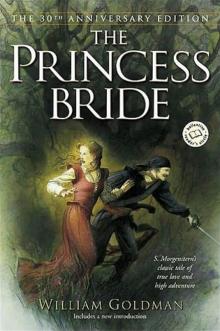 The Princess Bride
The Princess Bride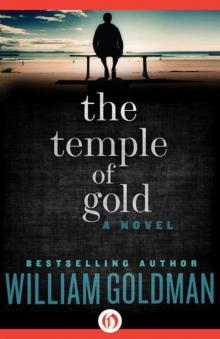 The Temple of Gold
The Temple of Gold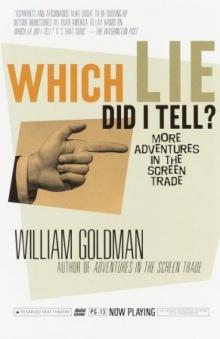 Which Lie Did I Tell?: More Adventures in the Screen Trade
Which Lie Did I Tell?: More Adventures in the Screen Trade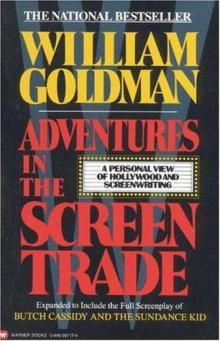 Adventures in the Screen Trade
Adventures in the Screen Trade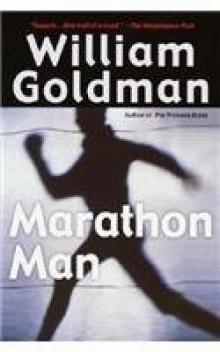 Marathon Man
Marathon Man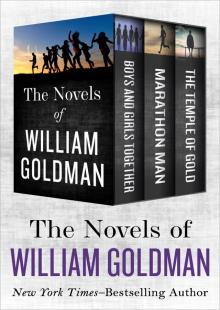 The Novels of William Goldman: Boys and Girls Together, Marathon Man, and the Temple of Gold
The Novels of William Goldman: Boys and Girls Together, Marathon Man, and the Temple of Gold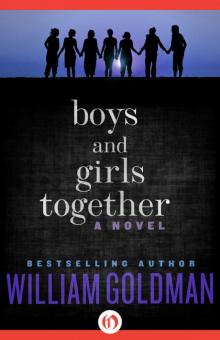 Boys and Girls Together: A Novel
Boys and Girls Together: A Novel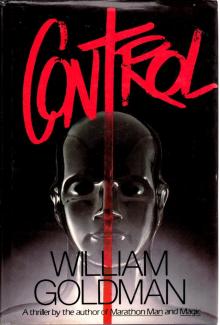 Control
Control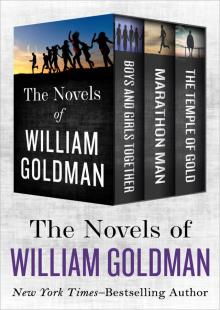 The Novels of William Goldman
The Novels of William Goldman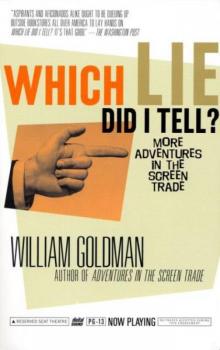 Which Lie Did I Tell?
Which Lie Did I Tell?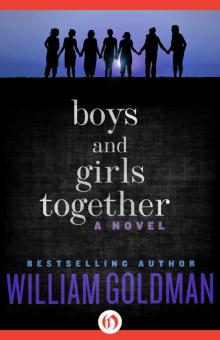 Boys & Girls Together
Boys & Girls Together